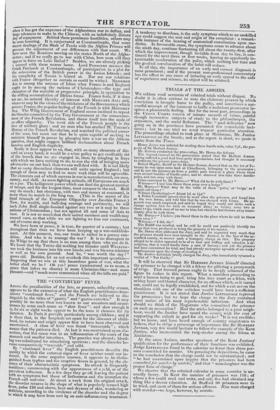TRIALS AT THE ASSIZES.
WE seldom read accounts of criminal trials without disgust. No doubt it is often curious to note the elaborate process by which conviction is brought home to the guilty, and sometimes a suc- cessful attempt of the innocent to baffle a malicious prosecutor in- spires a pleasurable feeling. But for the most part, proceedings in the Crown Courts consist of minute records of crime, painful though instructive subjects of study to the philanthropist, the statesman, and the social Reformer. The " gaol deliveries" now going on in the provinces have presented few remarkable inci- dents ; but to one trial we most request particular attention. The proceedings alluded to took place at Maidstone, Mr. Justice LITTLEDALE on the bench ; and as the report is short, we quote it entire from the Times.
Henry James was indicted for stealing three hurdle rods, value Md., the pro- perty of Sir Herbert Jenner. Mr. Scriven conducted the prosecution, Mr. Horne the defence. The learned counsel for the prosecution stated that Sir Herbert Jenner, having suffered a good deal from petty depredations, had thought it necessary to institute the present proceedings. Robert Higsby, Bailiff to Sir Herbert Jenner, deposed that on the 1st of Fe- bruary he was upon some land at Chiselhurst, belonging to the prosecutor ; and he saw the prisoner r from a public path towaids a place where there were several bundles of hurdle-poles, and he observed him take three hurdle- poles, and run away with them.
Cross-examined by Mr. Horne—" What did he do with them?
Witness—" I saw him throw them away over a hedge." Mr. Horne—" What may be the value of these 'poles,' or 'twigs,' as I should call them ? "
Witness (hesitating)—" About Id. or Itit" A Police Constable proved that he went after the prisoner, and found him at hi own house, and told him that he was charged with felony. He ap- peared very much surprised, and. said. he hoped they would not make such a charge against him tor such an innocent thing as taking away two or three twigs, which were of no use to him, but which he had thrown away imme- diately after he took therm Mr. Horne—" I believe you found them in the place where he said. he threw them away ? "
Witness—" I did, Sir."
The Bailiff was recalled, and he said. he could not positively identify the twigs that were produced as being the property of his master.
Mr. Horne then addressed the Jury, and said he regretted very much that the prisoner should have been brought to the Assizes, in the face of the as- sembled county, to answer such a trumpery charge as this. The property alleged to he stolen appeared to be of so base and trifling and valueless a de- scription, that it would hardly form a case of larceny ; and vet the prisoner had been committed for trial, and had already undergone upwards of six weeks' imprisonment upon the charge of stealing it.
Mr. Justice Littledale briefly charged. the Jury, who immediately returned a verdict of "Not Guilty."
It will be observed that Sir HERBERT JENNER himself directed the prisoner to be charged with a felony for pilfering a pennyworth of twigs. That learned person ought to be deeply ashamed of the figure he makes in this report. What a merciless proceeding to send a human being to gaol, bring him into court as a felon, with aching heart and blasted character, for an offence which, as it turned out, could not be legally established, and for which a cut across the shoulders with one of the switches would have been a sufficient punishment. It is not stated that Justice LITTLEDALE reproved the prosecutor; but we hope the charge to the Jury contained sonic notice of his most reprehensible behaviour. And what should we think of the Magistrate who committed the prisoner on such an accusation ? Had the sticks belonged to a poor neigh- bour, would the Justice have taxed the county with the cost of supporting the culprit in gaol for six weeks? It is not credible; but we know, and have heard enough of country magistrates to believe, that to oblige a personage of importance like Sir HERBERT JENNEE; very few would hesitate to follow the example of the Kent Justice, who incarcerated the twig-stealer among the felons at Maidstone.
At the same Assizes, another specimen of the Kent Justices' qualification for the performance of their functions was exhibited. Judge LITTLEDALE found in the calendar no fewer than three per- sons committed for murder. On perusing the depositions, he came to the conclusion that the charge could not be substantiated ; and " he had ascertained upon inquiry that the prisoners had been committed for munkr by mistake," and that " manslaughter was the proper form of charge." We observe that the criminal calendar in some counties is un- usually heavy. In Kent the number of prisoners was 116; of whom a few could read and write, and only five had obtained any thing like a decent education. At Stafford 90 prisoners were to be tried, and most of them for serious offences. Nine were charged with murder—we hope, however, by mistake.


























 Previous page
Previous page